|
|
|
Sort Order |
|
|
|
Items / Page
|
|
|
|
|
|
|
| Srl | Item |
| 1 |
ID:
139239
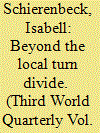

|
|
|
|
|
| Summary/Abstract |
This article builds on the contributions to this special issue by examining different approaches to the local turn and what can be learnt from applying them. The contributors agree on the imperative of understanding ‘the local’ in peacebuilding; however, there seems to be a multitude of ways forward in this regard. The immediate concern is how this acknowledgement translates into practices that allow for both efficiency and local emancipation in the building of peace. The article suggests giving up the ‘one-size-fits-all’ model of peacebuilding and engaging in context-based methods and research designs beyond generalisations. One way to go about this is to strive for interdisciplinary research – combining peace studies and political science with social anthropologists and area studies – but also to involve ‘the locals’ themselves in the process of taking a few methodological steps further.
|
|
|
|
|
|
|
|
|
|
|
|
|
|
|
|
| 2 |
ID:
151447


|
|
|
|
|
| Summary/Abstract |
There is a palpable sense of humility within the United Nations and other international institutions regarding peacebuilding. Rather than seeking to implement the liberal peace, they now pursue the more modest goal of ‘good enough’ outcomes. This shift reflects a growing consensus in the critical literature that space needs to be provided for the local agency that will ultimately determine the outcomes of peacebuilding. At first blush this emphasis on local agency is positive; it offers an important correction to the technocratic and generally top-down nature of liberal peacebuilding. But, is the ‘good enough’ approach to peacebuilding good enough? What are the pitfalls and potential of the local turn? This article uses a case study of Timor-Leste to answer these questions. It finds that the local turn can help lend legitimacy to the state and increase opportunities for political participation and the delivery of public goods at the local level. However, the emerging evidence from Timor-Leste also highlights the pitfalls of the local turn. Most significantly, the state can transfer responsibility for public goods provision to the local level in order to lessen the burden on the state and to divert attention from ineffective or illegitimate central institutions.
|
|
|
|
|
|
|
|
|
|
|
|
|
|
|
|
| 3 |
ID:
190174
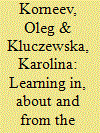

|
|
|
|
|
| Summary/Abstract |
Examining the European Union’s (EU) engagement with Central Asia since the early 1990s, we see an increased commitment to context sensitivity. Arguably, in order to design ‘better’ interventions, the EU needs to know more about this region. This article explores three means of EU learning: in the field – through EU officials’ first-hand experience of working at EU Delegations in Central Asia; about the field – through programmed channels of external expert knowledge, and in particular think tanks; and from the field – during institutionalized consultations with multiple local actors, such as academics, journalists and non-governmental organizations. It is argued that despite this complex learning infrastructure, EU knowledge production on Central Asia has a predominantly performative character. Rather than leading to changes in its relations with Central Asia, new knowledge produced by the EU aims at legitimizing this organization’s pre-existing frameworks of engagement and practices of interactions with the region, and substantiating existing policy priorities.
|
|
|
|
|
|
|
|
|
|
|
|
|
|
|
|
| 4 |
ID:
165116


|
|
|
|
|
| Summary/Abstract |
The literature on peacebuilding has increasingly emphasized the importance of the local level – a trend that has been called the local turn. For some researchers, the local turn can improve international peacebuilding interventions, while for others it is an agenda to promote an emancipatory and legitimate peace. There is however mixed evidence backing the argument that addressing local level issues in peacebuilding can make a substantial difference. The local turn reposes on assumptions that appear particularly problematic in an environment characterized by the lack of an elite-level pact, such as a conflict terminated in a military victory. Looking at the crisis in Côte d'Ivoire, which terminated in 2011 with the defeat of former president Laurent Gbagbo, this article highlights how the lack of elite level reconciliation compromises the effectiveness of actions aiming to promote local ‘social cohesion’. It also shows how the discourse and practices of the local turn can be appropriated by semi-authoritarian post-conflict governments in order to depoliticize the peacebuilding process. It concludes that the popularity of the ‘local turn’ among peacebuilders might be due more to the opportunity that it offers to eschew delicate national-level political issues, than to its supposed emancipatory potential.
|
|
|
|
|
|
|
|
|
|
|
|
|
|
|
|
| 5 |
ID:
146656
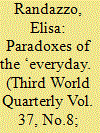

|
|
|
|
|
| Summary/Abstract |
With the advent of the local turn in the mid-2000s, critical approaches have attempted to rethink peace building from the bottom up, placing local agents at the centre of the debate, declaring the end of top-down governance and affirming the fragmented, complex and plural nature of the social milieu. While local turn approaches have become popular in peace-building theory, this article invites the reader to question and problematise the local turn’s use of the concept of ‘everyday’, in order to explore paradoxes and contradictions that indicate the need to think more deeply about the impact of the local turn’s project of critique.
|
|
|
|
|
|
|
|
|
|
|
|
|
|
|
|
| 6 |
ID:
174708
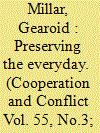

|
|
|
|
|
| Summary/Abstract |
Quite a lot of recent peacebuilding scholarship has deployed the concept of ‘the everyday’. In an extension of the local turn’s emphasis on agency and resistance, much of this scholarship interprets the everyday as inherently a site of politics. It does so either by interpreting every act (no matter how motivated) as an agentic political act, or by equating agentic political acts (at the local level) with the quotidian activities which define the everyday. This article argues, however, that representing the everyday in this way interprets both forms of activity in ways which have critical implications for peacebuilding theory, because both moves inadvertently strip everyday acts of the emergent creativity and innovation inherent to ‘everyday-ness’. Alternative understandings of and engagement with different forms of agency would encourage peace scholars to acknowledge the overtly political nature of peace projects and so to reserve ‘the everyday’ label for pre-political forms of action which may contribute to peace, but in a more unintentional, organic or emergent fashion. This is not to argue that everyday acts are a-political or non-political, but only that they do not have political motivations and are not themselves products of conscious will to power, or even to peace itself.
|
|
|
|
|
|
|
|
|
|
|
|
|
|
|
|
| 7 |
ID:
157977


|
|
|
|
|
| Summary/Abstract |
Since the early 2000s, the “local turn” has thoroughly transformed the field of peacebuilding. The European Union (EU) policy discourse on peacebuilding has also aligned with this trend, with an increasing number of EU policy statements insisting on the importance of “the local.” However, most studies on EU peacebuilding still adopt a top-down approach and focus on institutions, capabilities, and decision-making at the EU level. This special issue contributes to the literature by focusing on bottom-up and local dynamics of EU peacebuilding. After outlining the rationale and the scope of the special issue, this article discusses the local turn in international peacebuilding and identifies several interrelated concepts relevant to theorizing the role of the local, specifically those of effectiveness, ownership, and resistance. In the conclusion, we summarize the key contributions of this special issue and suggest some avenues for further research.
|
|
|
|
|
|
|
|
|
|
|
|
|
|
|
|
| 8 |
ID:
139227
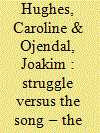

|
|
|
|
|
| Summary/Abstract |
This introduction presents how views on ‘the local turn’ in peacebuilding has evolved into a significant discourse. Currently, it has ‘its moment’ and is widely used by theorists and practitioners alike, by normative localists as well as by liberal policy-makers, albeit for different reasons and with differing intensions. We suggest that international interventions for the purpose of peacebuilding cannot be justified a priori, but requires resonance at the ‘receiving end’, which the local dimension potentially offers. It is however an elusive and contested concept that requires thorough scrutiny and critical assessment. Here a collection of conceptual and empirical articles is contextualised and introduced, painting a broad state-of-the-art of the pros and cons of the local turn.
|
|
|
|
|
|
|
|
|
|
|
|
|
|
|
|
| 9 |
ID:
163054
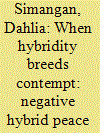

|
|
|
|
|
| Summary/Abstract |
This paper examines the unresolved tensions from international/liberal-local encounters during Cambodia’s post-conflict peacebuilding in the areas of governance and justice. The quick introduction but weak implementation of international/liberal norms and institutions enabled the local elite to contextualise, negotiate, resist and reject those international/liberal norms and institutions to preserve an elite-centred status quo. The outcome of these international/liberal-local encounters is a negative hybrid peace in which peace is neither liberal nor emancipatory. The analysis in this paper contributes to the discussion on hybridity in peacebuilding by describing the characteristics, explaining the formation process and tracing the long-term consequences of negative hybrid peace
|
|
|
|
|
|
|
|
|
|
|
|
|
|
|
|
|
|
|
|
|